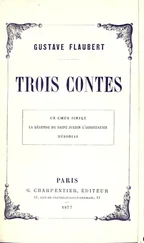The two children were of equal importance; they were united in her heart and their fate was to be the same.
The chemist informed her that Victor's vessel had reached Havana. He had read the information in a newspaper.
Felicite imagined that Havana was a place where people did nothing but smoke, and that Victor walked around among negroes in a cloud of tobacco. Could a person, in case of need, return by land? How far was it from Pont–l'Eveque? In order to learn these things, she questioned Monsieur Bourais. He reached for his map and began some explanations concerning longitudes, and smiled with superiority at Felicite's bewilderment. At last, he took a pencil and pointed out an imperceptible black point in the scallops of an oval blotch, adding: "There it is." She bent over the map; the maze of coloured lines hurt her eyes without enlightening her; and when Bourais asked her what puzzled her, she requested him to show her the house Victor lived in. Bourais threw up his hands, sneezed, and then laughed uproariously; such ignorance delighted his soul; but Felicite failed to understand the cause of his mirth, she whose intelligence was so limited that she perhaps expected to see even the picture of her nephew!
It was two weeks later that Liebard came into the kitchen at market–time, and handed her a letter from her brother–in–law. As neither of them could read, she called upon her mistress.
Madame Aubain, who was counting the stitches of her knitting, laid her work down beside her, opened the letter, started, and in a low tone and with a searching look said: "They tell you of a—misfortune. Your nephew—"
He had died. The letter told nothing more.
Felicite dropped on a chair, leaned her head against the back, and closed her lids; presently they grew pink. Then, with drooping head, inert hands and staring eyes she repeated at intervals:
"Poor little chap! poor little chap!"
Liebard watched her and sighed. Madame Aubain was trembling.
She proposed to the girl to go to see her sister in Trouville.
With a single motion, Felicite replied that it was not necessary.
There was a silence. Old Liebard thought it about time for him to take leave.
Then Felicite uttered:
"They have no sympathy, they do not care!"
Her head fell forward again, and from time to time, mechanically, she toyed with the long knitting–needles on the work–table.
Some women passed through the yard with a basket of wet clothes.
When she saw them through the window, she suddenly remembered her own wash; as she had soaked it the day before, she must go and rinse it now. So she arose and left the room.
Her tub and her board were on the bank of the Toucques. She threw a heap of clothes on the ground, rolled up her sleeves and grasped her bat; and her loud pounding could be heard in the neighbouring gardens. The meadows were empty, the breeze wrinkled the stream, at the bottom of which were long grasses that looked like the hair of corpses floating in the water. She restrained her sorrow and was very brave until night; but, when she had gone to her own room, she gave way to it, burying her face in the pillow and pressing her two fists against her temples.
A long while afterward, she learned through Victor's captain, the circumstances which surrounded his death. At the hospital they had bled him too much, treating him for yellow fever. Four doctors held him at one time. He died almost instantly, and the chief surgeon had said:
"Here goes another one!"
His parents had always treated him barbarously; she preferred not to see them again, and they made no advances, either from forgetfulness or out of innate hardness.
Virginia was growing weaker.
A cough, continual fever, oppressive breathing and spots on her cheeks indicated some serious trouble. Monsieur Popart had advised a sojourn in Provence. Madame Aubain decided that they would go, and she would have had her daughter come home at once, had it not been for the climate of Pont–l'Eveque.
She made an arrangement with a livery–stable man who drove her over to the convent every Tuesday. In the garden there was a terrace, from which the view extends to the Seine. Virginia walked in it, leaning on her mother's arm and treading the dead vine leaves. Sometimes the sun, shining through the clouds, made her blink her lids, when she gazed at the sails in the distance, and let her eyes roam over the horizon from the chateau of Tancarville to the lighthouses of Havre. Then they rested on the arbour. Her mother had bought a little cask of fine Malaga wine, and Virginia, laughing at the idea of becoming intoxicated, would drink a few drops of it, but never more.
Her strength returned. Autumn passed. Felicite began to reassure Madame Aubain. But, one evening, when she returned home after an errand, she met M. Boupart's coach in front of the door; M. Boupart himself was standing in the vestibule and Madame Aubain was tying the strings of her bonnet. "Give me my foot–warmer, my purse and my gloves; and be quick about it," she said.
Virginia had congestion of the lungs; perhaps it was desperate.
"Not yet," said the physician, and both got into the carriage, while the snow fell in thick flakes. It was almost night and very cold.
Felicite rushed to the church to light a candle. Then she ran after the coach which she overtook after an hour's chase, sprang up behind and held on to the straps. But suddenly a thought crossed her mind: "The yard had been left open; supposing that burglars got in!" And down she jumped.
The next morning, at daybreak, she called at the doctor's. He had been home, but had left again. Then she waited at the inn, thinking that strangers might bring her a letter. At last, at daylight she took the diligence for Lisieux.
The convent was at the end of a steep and narrow street. When she arrived about at the middle of it, she heard strange noises, a funeral knell. "It must be for some one else," thought she; and she pulled the knocker violently.
After several minutes had elapsed, she heard footsteps, the door was half opened and a nun appeared. The good sister, with an air of compunction, told her that "she had just passed away." And at the same time the tolling of Saint–Leonard's increased.
Felicite reached the second floor. Already at the threshold, she caught sight of Virginia lying on her back, with clasped hands, her mouth open and her head thrown back, beneath a black crucifix inclined toward her, and stiff curtains which were less white than her face. Madame Aubain lay at the foot of the couch, clasping it with her arms and uttering groans of agony. The Mother Superior was standing on the right side of the bed. The three candles on the bureau made red blurs, and the windows were dimmed by the fog outside. The nuns carried Madame Aubain from the room.
For two nights, Felicite never left the corpse. She would repeat the same prayers, sprinkle holy water over the sheets, get up, come back to the bed and contemplate the body. At the end of the first vigil, she noticed that the face had taken on a yellow tinge, the lips grew blue, the nose grew pinched, the eyes were sunken. She kissed them several times and would not have been greatly astonished had Virginia opened them; to souls like this the supernatural is always quite simple. She washed her, wrapped her in a shroud, put her into the casket, laid a wreath of flowers on her head and arranged her curls. They were blond and of an extraordinary length for her age. Felicite cut off a big lock and put half of it into her bosom, resolving never to part with it.
The body was taken to Pont–l'Eveque, according to Madame Aubain's wishes; she followed the hearse in a closed carriage.
After the ceremony it took three quarters of an hour to reach the cemetery. Paul, sobbing, headed the procession; Monsieur Bourais followed, and then came the principal inhabitants of the town, the women covered with black capes, and Felicite. The memory of her nephew, and the thought that she had not been able to render him these honours, made her doubly unhappy, and she felt as if he were being buried with Virginia.
Читать дальше








![Гюстав Флобер - Закат Карфагена [Сборник]](/books/414440/gyustav-flober-zakat-karfagena-sbornik-thumb.webp)

